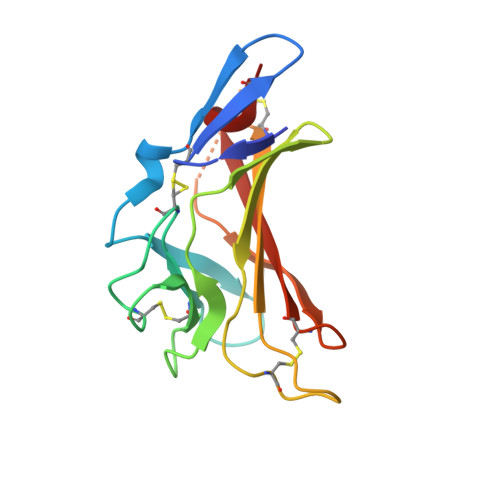Functional evolution of IGF2:IGF2R domain 11 binding generates novel structural interactions and a specific IGF2 antagonist.
Frago, S., Nicholls, R.D., Strickland, M., Hughes, J., Williams, C., Garner, L., Surakhy, M., Maclean, R., Rezgui, D., Prince, S.N., Zaccheo, O.J., Ebner, D., Sanegre, S., Yu, S., Buffa, F.M., Crump, M.P., Hassan, A.B.(2016) Proc Natl Acad Sci U S A 113: E2766-E2775
- PubMed: 27140600
- DOI: https://doi.org/10.1073/pnas.1513023113
- Primary Citation of Related Structures:
2M68, 2M6T, 5IEI - PubMed Abstract:
Among the 15 extracellular domains of the mannose 6-phosphate/insulin-like growth factor-2 receptor (M6P/IGF2R), domain 11 has evolved a binding site for IGF2 to negatively regulate ligand bioavailability and mammalian growth. Despite the highly evolved structural loops of the IGF2:domain 11 binding site, affinity-enhancing AB loop mutations suggest that binding is modifiable. Here we examine the extent to which IGF2:domain 11 affinity, and its specificity over IGF1, can be enhanced, and we examine the structural basis of the mechanistic and functional consequences. Domain 11 binding loop mutants were selected by yeast surface display combined with high-resolution structure-based predictions, and validated by surface plasmon resonance. We discovered previously unidentified mutations in the ligand-interacting surface binding loops (AB, CD, FG, and HI). Five combined mutations increased rigidity of the AB loop, as confirmed by NMR. When added to three independently identified CD and FG loop mutations that reduced the koff value by twofold, these mutations resulted in an overall selective 100-fold improvement in affinity. The structural basis of the evolved affinity was improved shape complementarity established by interloop (AB-CD) and intraloop (FG-FG) side chain interactions. The high affinity of the combinatorial domain 11 Fc fusion proteins functioned as ligand-soluble antagonists or traps that depleted pathological IGF2 isoforms from serum and abrogated IGF2-dependent signaling in vivo. An evolved and reengineered high-specificity M6P/IGF2R domain 11 binding site for IGF2 may improve therapeutic targeting of the frequent IGF2 gain of function observed in human cancer.
Organizational Affiliation:
Tumour Growth Control Group, Oxford Molecular Pathology Institute, Sir William Dunn School of Pathology, University of Oxford, Oxford OX1 3RE, United Kingdom;

















